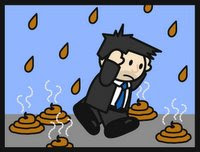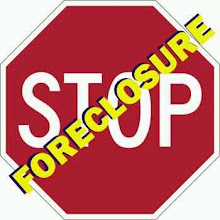By George W. Mantor
On Thursday, the Financial Crisis Inquiry Committee released its long awaited report on how the destruction of the middle class was engineered.
If you listen to three dissenting members, it was a form of suicide. Like Lemmings, we raced to the cliff of financial destruction and hurled ourselves into poverty because all of the rest of the Lemmings were doing it.
Not with a bang, but a whimper did this nearly seven hundred page whitewash land with a thud in the halls of congress.
In the days leading up to the release of the report, some of the dissenting members…those who didn’t think there was quite enough whitewash…came out ahead of the report and blamed it all on the goal of homeownership.
Wait a minute! They want us to believe that Americans’ desire to own the roof over our heads destroyed the global economy?
It wasn’t the inflated appraisals, the predatory servicing fraud, the new and improved loan terms designed to assure default?
Nor, apparently, was it the fact that Wall Street bet massive amounts of other people’s money that the economy would collapse; it did, and they got huge bonuses.
All of that was said in testimony before the committee. It’s all in the report, as they say.
But, there has been no call for prosecutions or to apply the law equally to the middle class.
As to “foreclosure gate”, you have to pile through over 400 pages to get to this relating to MERS; but, it is exactly what I have been saying for nearly two years. The following italicized section is directly from the report.
“The standing of MERS or its designees to foreclose has been called into question by courts and academics, however. In a hearing before the House Judiciary Committee on the foreclosure crisis, New York State Supreme Court Justice F. Dana Winslow testified that “standing has become such a pervasive issue that I frequently use the term ‘presumptive mortgagee in foreclosure’” to describe MERS. Because of “multiple unrecorded transfers of the legal ownership of the mortgage,” it is unclear whether MERS continued to be the mortgagee after subsequent sales of the loan, according to Winslow.
Moreover, courts have held that MERS does not own the underlying note and therefore cannot transfer the note or the deed of trust, or foreclose upon the property.
Winslow also highlighted other deficiencies in MERS’ standing, many involving sloppy paperwork: the failure to produce the correct promissory notes in court during foreclosure proceedings; gaps in the chain of title, including printouts of the title that have differed substantially from information provided previously; retroactive assignments of notes and mortgages in an effort to clean up the paperwork problems from earlier years; questionable signatures on assignments and affidavits attesting to the ownership of the note and mortgage; and questionable notary stamps on assignments.
Recently, a bankruptcy court ruled that the Bank of New York could not foreclose on a loan it had purchased from Countrywide, because MERS had failed to endorse or deliver the note to the Bank of New York as required by the pooling and servicing agreement. This ruling could have further implications, because it was customary for Countrywide to maintain possession of the note and related loan documents when loans were securitized.
Across the market, some mortgage securities holders have sued the issuers of those securities, demanding that the issuers rescind their purchases. If the legal challenges succeed, investors that own mortgage-backed securities could force the issuers to buy them back at the original pricepossibly with interest. The issuers would then be the owners of the securities and would bear the risk of loss.
The Congressional Oversight Panel said it is on the lookout for such risks: “If documentation problems prove to be pervasive and, more importantly, throw into doubt the ownership of not only foreclosed properties but also pooled mortgages, the consequences could be severe.”
This sentiment was echoed by University of Iowa law professor Katherine Porter who has studied foreclosures and the law: “It is lack of knowledge of how widespread the problems may be that is turning the allegations into a crisis. Lack of knowledge feeds speculation and worst-case scenarios.”
Adam Levitin, a Georgetown University associate professor of law, has estimated that the claims could be in the trillions of dollars, rendering major U.S. banks insolvent.”
Well, we wouldn’t want that now, would we?
It sounds too dire. And so, the question becomes what to do about it. Apparently, nothing.
There is so much guilt involved that it touches the majority of the privileged class.
Consider this ominous sign: Iowa Attorney General, Tom Miller, is heading the 50 state investigation into this fraud. At the beginning of the investigation, he was gung ho to keep families in their homes and put bankers in jail.
Then, last week, they propped his hollowed out former persona in front of the cameras and from his eyes you could see that the fire was out. Like a Stepford Wife, he appeared to have been “gotten to”.
Hey, Tom it doesn’t matter. The banks cannot be saved. They are already on life support and will succumb whether we pull the plug or not. But, we will never forget where you and others whose job it is to enforce the law took your paychecks and blessed the fraud.
Do the math. Foreclosing on 15 million homes won’t help; it actually will make things worse. Banks are already abandoning homes before the final sale all over the country because they have learned that if you seize too many, they aren’t worth much.
But, it wouldn’t matter if they foreclosed on every home in America. There isn’t enough equity to ever dig out of the massive global asset bubble they created.
So, we have a dilemma. The proverbial slippery slope. Do we let the banks get away with it and create a tidal wave of homelessness, or do we uphold the laws that make all of this a crime?
All of the above constitutes a massive fraud perpetrated on investors, borrowers, and law enforcement. The prospectuses are full of lies; the pooling and servicing agreements were routinely violated by the very people who wrote them. Tax and securities laws were repeatedly broken. Then, they forged documents and proffered perjured testimony to complete the final chapter of the business plan.
The evidence obtained by the committee through sworn testimony proves that there was, and continues to exist, numerous crimes in progress, and yet, there is little in the committee report that suggests that it will be anything but business as usual.
What ever happened to our lofty ideals about America being “a nation of laws”? Even more perplexing, how can someone who studies the law and chooses to become an “officer of the court” have as little regard for the law than the lawyers who represent financial intermediaries who routinely commit fraud upon the court?
But, where the real problem lies is with the judges who look the other way as foreclosure mills submit obviously forged documents and commit perjury for the most sinister of purposes.
Some won’t. Not judges Schack or Long or Tepper or Buford or Dawson whose levelheaded decisions have reverberated around the country; but still, people who never missed a payment are losing their homes to a system that cannot be stopped.
While foreclosure mills implement the final stage of a business plan based on illegally seizing 15 million homes and emptying all pension funds, a handful of court cases suggest that the banks may not be too big to fail after all.
Although most foreclosures, about 95%, go uncontested, a few have finally made their way through a more thorough review of the facts, and well-informed, fair-minded judges are concurring that, in most cases, the foreclosing entity lacks the legal right to do so.
The reason isn’t something that can be fixed by simply altering county recordings. The chain of title was willfully and deliberately breached in order to pledge the receivables, principal and interest payments, to multiple pools.
In order to save the banks, all of the following frauds will have to be blessed.
Fraud by mortgage originators against lender/investors.
Here are but two of hundreds of examples.
Bank of America Inc.’s Countrywide Financial unit, acquired by the bank in 2008, was accused of “massive fraud” in a lawsuit by investors who claim they were misled about mortgage-backed securities.
TIAA-CREF Life Insurance Co., New York Life Insurance Co. and Dexia Holdings Inc. are among a dozen institutional investors who filed complaints in New York State Supreme Court.
The investors claim they bought hundreds of millions of dollars of Countrywide mortgage-backed securities from 2005 to 2007 because they wanted conservative, low-risk investments. They said they relied on term sheets, prospectuses and other materials provided by the firm that were recklessly or knowingly false.
“Countrywide was an enterprise driven by only one purpose to originate and securitize as many mortgage loans as possible into MBS to generate profits for the Countrywide defendants without regard to the investors that relied on the critical, false information provided to them with respect to the related certificates,” according to the complaint.
In October, Mozilo agreed to pay a record $67.5 million to settle U.S. Securities and Exchange Commission allegations that he misled investors.
Former Bear Stearns mortgage executives who now run mortgage divisions of Goldman Sachs, Bank of America, and Ally Financial have been accused of cheating and defrauding investors through the mortgage securities they created and sold while at Bear. According to e-mails and internal audits, JPMorgan had known about this fraud since the spring of 2008, but hid it from the public eye through legal maneuvering. Recently, a lawsuit filed in 2008 by mortgage insurer Ambac Assurance Corp against Bear Stearns and JPMorgan was unsealed. The lawsuit’s supporting e-mails, going back as far as 2005, highlight Bear traders telling their superiors they were selling investors like Ambac a “sack of shit.”
Fraud upon the courts in submitting forged documents.
Fraud upon recording agencies where the bogus paperwork has been filed.
Fraud upon the IRS by violating numerous tax laws in the process of issuing and managing the investments.
Fraud upon accounting rules and regulations.
Fraud upon shareholders who suffer reduced earnings as a result of the crimes of senior executives.
Fraud upon securities laws.
Taken altogether it weaves a rich tapestry of overlapping frauds starting, not at the bottom, but the top.
And yet, there is wide spread belief that the consequences of holding the perpetrators accountable would be so horrific that lawmakers at every level are scrambling to see if there isn’t some way to retroactively change a host of laws.
Maybe we can’t do anything about it, but I did see where Al Qaeda is thought to be targeting executives of the big banks. The American middle class appears to be getting a new ally.
George W. Mantor
The Real Estate Professor
Founder, American Foreclosure Resistance Movement
http://www.realtown.com/gwmantor/blog
1611A South Melrose Drive, #134
Vista, CA 92081
760-758-0802
“First they ignore you, then they ridicule you, then they fight you, then you win.” Mahatma Gandhi
__._,_.___
Wednesday, March 16, 2011
Subscribe to:
Post Comments (Atom)












No comments:
Post a Comment